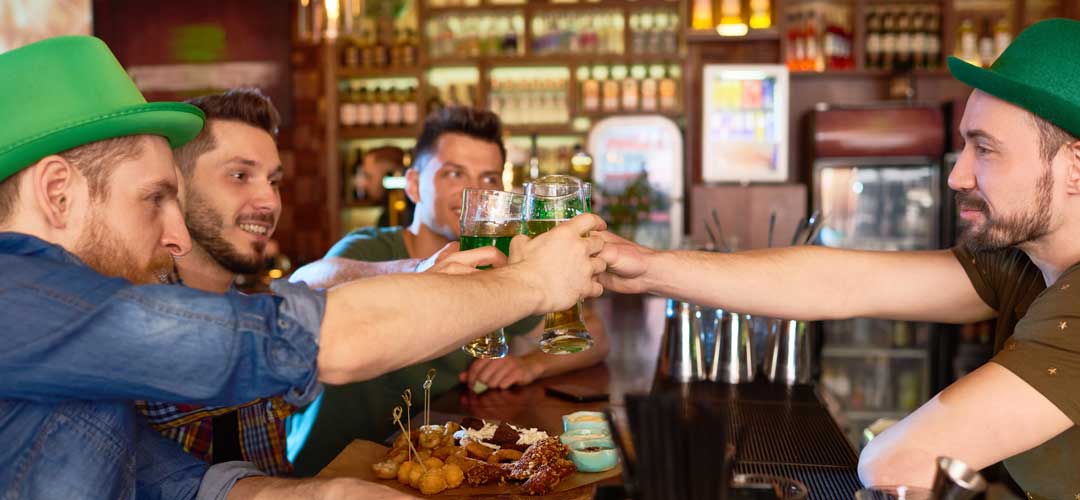
As St. Patrick’s Day approaches on March 17th, it is hard not to notice the abundance of green-hued drinks, Shamrock-themed attire, and festive revelry that marks the occasion.
St. Patrick’s Day first started to honor Saint Patrick on the anniversary of his death. As the years went by, St. Patrick’s Day shifted its focus from the man himself to encompass broader Irish customs, culture, and history. In the 1840s, the celebration made its way to America as thousands upon thousands of Irish immigrants fled the potato famine and held a grand St. Patrick’s Day parade. Since then, the American people have warmly embraced the holiday, infusing it with their own unique interpretations and continually evolving traditions.
The Risks of St. Patrick’s Day
While some view St. Patrick’s Day as a celebration of Ireland’s patron saint and Ireland’s rich cultural heritage, some may see the day as an excuse to indulge in beer and spirits. Among the latter, could the celebrations turn a fun holiday into a dangerous event? According to the United States Department of Transportation, St. Patrick’s Day period saw more than 36% of the crash fatalities involving a drunk driver. From 2016 to 2020, 287 people died in drunk-driving crashes during St. Patrick’s day1.
While bars and alcohol advertisers frequently emphasize the importance of responsible drinking, it is important to acknowledge that drinking establishments and bartenders who serve these libations can sometimes still be held accountable for injuries or fatalities resulting from their patrons’ alcohol consumption. Although not as common, there are situations in which bars have a legal and ethical obligation to refrain from overserving patrons, and failing to do so can have serious consequences.
Dram Shop Law is a type of statute that holds any business establishment strictly liable for selling alcoholic beverages to an obviously intoxicated person. The intention of the strict liability was to increase the responsibility of those profiting from the sales of alcohol to guests in the hopes of reducing alcohol-related accidents. Dram Shop Laws even extended to homeowners who served alcohol to guests and made it possible for drunk drivers to sue bars that served them alcohol if they were injured in a car accident themselves.
California’s Duty of Care
Under California law, business owners generally owe a duty of care to patrons of their establishment. In Delgado v Trax Bar & Grill (2005) 36 Cal.4th 224, 241, California law has recognized that a business owner/server who serves alcoholic drinks to customers on the owner’s premises must “exercise reasonable care to protect its patrons from injury at the hands of fellow guests.” A business owner owes its patrons a general duty of maintenance which includes the duty to take reasonable steps to secure common areas against foreseeable criminal acts of third parties that are likely to occur in the absence of such precautionary measures.
California’s Take On Dram Shop Law
In 2012, California enacted California Civil Code Section 1714 which extensively limited third-party liability for injuries caused by intoxicated individuals, effectively eliminating Dram Shop lawsuits in California. Distinguishing from Delgado, now a vendor who supplies alcohol to a person 21 years of age or older cannot be held liable for damages if the person then injures someone else, even if the person was obviously intoxicated at that time when the alcohol was served. California Civil Code Section 1714 establishes that providing someone alcohol is not the proximate, legal cause of an accident. The rationale is that the proximate cause of injuries is the intoxicated person’s actions, including consumption of alcohol, not the server who provided the alcohol.
Further strengthening the protections for business owners, California adopted another statute barring liability for the business owner in the event a person is injured or killed by an intoxicated patron. California Business and Professions Code section 25602 states that no person who sells, furnishes, or gives away alcoholic beverages shall be civilly liable to any injured person as a result of intoxication by the consumer of such alcoholic beverage.
The only exception to California Civil Code Section 1714 and California Business and Professions Code Section 25602 is if a business or host provides alcohol to an obviously intoxicated minor where the furnishing of that beverage to the minor is the proximate cause of the injury or death. In other words, a business or host may be found liable for providing alcohol to a minor who subsequently injures a third party. It does not matter if the person does not look or act like a minor.
How to Prove the Establishment Knew the Person Was Underage?
Establishing that a commercial business was aware of, or should have been aware of, a customer under the age of 21 would typically involve demonstrating that the establishment either:
- Did not check the identification of the customer
- Accepted an identification showing the customer was under 21
Saint Patrick’s Day is a fun and festive holiday that many people look forward to celebrating. It is important to remember to act responsibly and not drink and drive. Drinking and driving can have serious consequences, including accidents, injuries, and even fatalities. Therefore, if you plan to drink on Saint Patrick’s Day, make sure you have a designated driver, use public transportation, or arrange for a ride-sharing service to ensure that you get home safely. Let us all enjoy the holiday and celebrate responsibly!

Sarah previously practiced and clerked with other Los Angeles County law firms. Prior to law school, Sarah worked in real estate and marketing. She is a graduate of Whittier Law School where she was on the Dean’s List. She received her Bachelor of Arts degree in Political Science from University of California, Irvine. She is fluent in Armenian.
